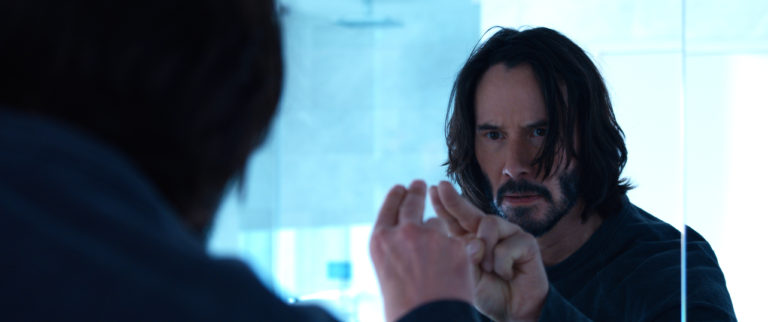The Matrix Resurrections (2021 | USA | 148 minutes | Lana Wachowski)
There are many things a Matrix movie has become known as being. Ambitious, eccentric, and groundbreaking are words that come to mind. Even when not altogether successful, the films about questioning our reality have more than redefined what is possible when it comes to cinema.
Not only is The Matrix Resurrections all that and beyond, it is one of the most interesting sequels that revisits a beloved series of all time. Challenging what it means to fashion a creative work in a world of endless sequels, it is as brilliant a way to end the year as one could hope for. It plays with time, putting the old in conversation with the new through visual poetry that’s given life by Lana Wachowski’s reflective yet playful direction. It is at its very best in its opening act and does have moments of uncertainty towards the end. However, the positive moments more than shine through because of the film’s willingness to challenge all that a sequel is supposed to be.
Much of this is built around the fact that Neo (Keanu Reeves) is not really himself these days. He is actually Thomas Anderson, a famous video game designer who is being told by his corporate overlords at Warner Bros to return to the property that made him famous: The Matrix. It is a wink to the audience that becomes so much more as Mr. Anderson goes through day after day of revisiting his past work with little enthusiasm and a generally disconnected demeanor about it all. This is no longer what he loves and not something he is particularly enthused about going back to.
Yet everyone else on the film crew…I mean the other video game designers are ecstatic. They recount how much of an impact the original had on them, throwing out theories about its deeper meanings and themes. They speculate about what it all could have meant while Mr. Anderson watches on, going through the routines of his day while questioning everything about what his life has become. He is exhausted by his existence and this creative vacuum of nostalgia that is his next endeavor.
If this wasn’t already clear, The Matrix Resurrections is commenting on itself and its creation. It isn’t just about breaking the fourth wall for the humor of the gag, even as it is genuinely funny, but is about building a deeper creative musing on what it means to be returning back to an old story. There is a fondness for the world, much like one would have for an old friend, while also being deeply tired by some of the rules that have been laid out for it. As Mr. Anderson feels like he must recreate his old work, it becomes clear that Wachowski herself shares in the exhaustion of corporate obligation to a sequel. The use of the song “White Rabbit” by Jefferson Airplane, already seen in the trailer, becomes something even more in the full feature and makes for one of the best sequences of the year.
The tone in which the film’s pillories itself is a joyous one, though it masks something deeper that becomes far more interesting. As the drudgery of conformity and creative bankruptcy begin to overtake Mr. Anderson’s world, he begins to desire something more. He sees love and value in his past life with Trinity (Carrie-Anne Moss), now living in the new simulacra of our world as Tiffany. The electricity of the chemistry the two share, both as actors and as characters, is undeniable. It speaks to the sense of joy that comes not from what we produce in life, but the people we get to share it all with. As Mr. Anderson begins to awaken once more as Neo, it is love that guides him along the way.
If that sounds cheesy as all hell, you’re damn right it does. There hasn’t been quite an unabashedly romantic science fiction film since…well….The Matrix in 1999. Just as love was what saved Neo in the original, it is what will save him here. It won’t be the success of his new project or the praise of his corporate boss. It will be the more meaningful parts of his life, his connection to the person that he loves more than anything, that will prove to be his ultimate salvation. There is so much that could go wrong with this, but the layers of each scene that peel back this ultimate revelation all are completely earned. The pacing and progression of the editing shapes this central theme into a compelling narrative core.
Surrounding that core is a vibrant world that could not be more of a return to form for Wachowski. Yes, technology has evolved and changed to allow for more ambitious visual sequences, though it is also the way the director melds it with the old film that proves most significant. In many ways it recalls 2017’s T2 Trainspotting, which similarly intercut in old scenes from the original film to create something more profound about memory and our pasts. With The Matrix Resurrections, these scenes echo each other and serve to establish how the patterns of the character’s past lives inform their futures. This extends to the new characters, Yahya Abdul-Mateen II’s Morpheus and Jessica Henwick’s Bugs, who are both wonderfully realized additions that expand the story in new directions.
It will fall to both this new version of Morpheus and Bugs to break Neo out of his mind prison once more. They will travel through portals and doors yet again, though with some alterations that challenge what we knew about moving through the Matrix. A scene on a train in particular is a standout, capturing a surreal and visually stimulating world that overwhelms the senses. Other settings are less gorgeous as many of them take place within the real world as we know it, though this drabness feels intentional. Details about that “reality” are best left minimal as there is a whole new world that has taken form since Neo and Trinity saved it all those years ago. The revelations and changes the film lays out are quite expansive for a single section of the film, showing us how the present conflict between humans and machines has found some degree of equilibrium.
If there was any downside it is that much of the action and fighting sequences are not as brilliant as what has come before it in the other films. They still are serviceable though not in a way that will blow you away as some of the best ones from the originals did. If anything, they almost feel like a distraction from the more compelling aspects of the characters and their journey to find each other. This becomes especially unfortunate as it leaves Trinity feeling like she isn’t always much of a main character, though the impact of her presence echoes throughout the whole film. There is a great degree of care shown to those characters that you can’t help but root for them amidst these ongoing struggles. There is also a respectable sense of restraint that makes the film’s conclusion still have consequences without going too far over the top that the characters get lost. It isn’t your typical the ‘world is going to end finale’ as the film grounds itself in a rescue mission around one person and what they mean to the characters.
It is in these characters that The Matrix Resurrections continually finds something transcendent that rings strong and true. They are extensions of Wachowski’s psyche and an expression of her creativity while also having a voice of their own. When Neo mourns all he has lost and how he feels like all he has done, which he must do again, was for naught you feel the pain in every word. This is due to Reeves giving an outstanding performance that operates in perfect harmony with Wachowski’s writing. Their voices become one in these key moments, crafting a truly remarkable piece of art that shows you can leave the past behind to create something stunning and new.
Note: Josh and I both went into this last big prestige blockbuster of the year with pretty high hopes; one of us left elated and the other was desperate to leave. Check out his take here.
You can watch The Matrix Revolutions in theaters and on HBO Max starting December 22nd.




